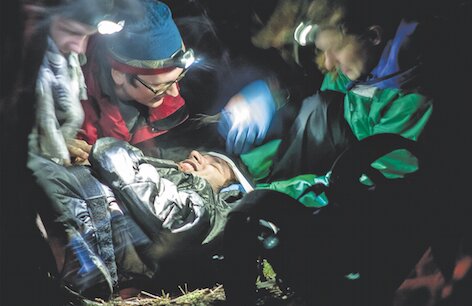
Four days, 30 miles, and two drainages removed from civilization, your summer backpacking trip in the Olympics comes to a screeching halt. While negotiating a boulder field at the headwaters of the Hoh River, one of your two hiking partners slips off a lichen-encrusted boulder and breaks their leg. After helping them back up to a flat spot to check them over and rest, your well-trained brain starts racing. Faced with the daunting task of helping your friend hobble the marathon distance to the trailhead or sending the fastest able-bodied hiker down the trail solo, someone needs to take the role of a leader.
In a situation like this, would you have the skills and know-how to make the right call?
A Wilderness First Responder (WFR) course aims to give some of the appropriate background experience and readiness to act in situations where immediate professional help is not available. The courses are usually 10 days with a mandatory 70-80 hours of class time. Successful completion of the course depends on passing a written and practical exam as well as effective communication and skill use during a capstone “scenario” that deals with an accident requiring triage or multiple victim management. Skills learned during the course range from basic life support to trauma, the onset of sudden illness and the preparation and transportation of injured individuals.
Days of instruction are split between classroom-based lectures and hands-on training that gives you tangible experience to help speed up decision-making and response time in the event of an accident. Both of these methods of instruction are crucial to dealing with real emergency situations. Topics of instruction include recognizing and dealing with respiratory and circulatory shock, soft tissue damages, bone fractures and joint strains, immobilization of suspected head or spine injury patients and the necessary processes of dealing with evacuating an injured person from a wilderness setting depending on the type of injury. Both are mixed with enough variation to keep the course engaging.
Instructors will introduce you to the SOAP note (Subjective, Objective, Assessment and Plan), a standard method of recording incidents. The subjective part of the note details the patient’s chief complaint as far as onset, location, duration, character in regard to sharp, dull, or throbbing, alleviating of aggravating factors and growth of pain, time span and severity.
The objective part of the note is your own assessment of the patient. Things such as vital signs and patient attributes and findings from a physical examination are pertinent to this step. Your assessment of the patient comprises what is likely wrong with them and if there are any changes over time in the severity of their complaint. The final step, your plan, details what you will do to help the patient.
Classroom applications of skills include splinting exercises, learning how to take life signs and monitor their change, sizing up the scene of an accident, body substance isolation to ensure you stay healthy and knowing the resources needed to deal with the accident. The course includes an American Red Cross CPR certification that is valid for two years.
There’s nothing like experiencing the beauty of the outdoors with friends and family, but being prepared for an emergency should be a part of every group’s first aid kit. A WFR course helps you prepare for the worst so you can make the best of your time in the wilderness.
Courses:
Canada West Mountain School
Squamish, B.C.
June 21-29 @ Squamish
$785 + GST
Remote Medical International
Seattle, WA
June 13-22 @ Discover Park Environmental
Learning Center • $715
Remote Medical International
Bellingham, WA
June 14-23 @ Western
Washington University
$625
National Outdoor Leadership School
Olympic National Park, WA
June 21-29 @ Nature Bridge Park. Cost To Be Determined.
Remote Medical International
Seattle, WA
December 12-21 @ Discover Park Environmental
Learning Center • $715